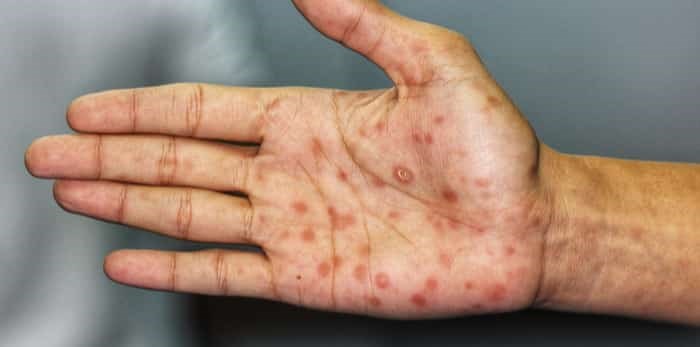 Photo: Syphilis infection / Shutterstock
Photo: Syphilis infection / Shutterstock
The syphilis infection rate is the highest it has been in 30 years in B.C. and health officials warn that an infection can lead to serious complications.
Syphilis is a bacterial infection that can be cured with antibiotics, but left untreated, it can lead to serious complications including damage to the brain, heart and other organs. The infection can have no symptoms, and, as a result, a person may not know that they have syphilis.
According to the BC Centre for Disease control, there were 919 new cases of infectious syphilis in B.C. in 2018 - a rate of 18.4 per 100,000.
While the BCCDC states that syphilis continues to disproportionately affect gay, bisexual and other men who have sex with men in B.C., if adds that infections are also increasing among women. Specifically, there has been a nearly 40 per cent increase of infectious syphilis among women 15 to 49 years old from 2017 to 2018.
Vancouver Is Awesome spoke to Troy Grennan, Physician Lead, HIV/STI program, BCCDC, about why the infection rate is at its highest, as well as what people need to do to stay healthy.
In regard to the 40 per cent increase of syphilis infections among women, Grennan notes that it is important to contextualize that number. For example, he says that roughly 1000 new cases of syphilis are projected for 2019, but only about 50 of those will be women. As a result, women represent a comparatively small population of new cases. However, he remarks that it is still important to look at why that number is rising, as well as what women can do to prevent or treat an infection.
"We've really been seeing a year over year increase over the last decade," explains Grennan. "The numbers have been steadily increasing, but there have been large increases, too."
Grennan adds that while syphilis rates are increasing, it still has the lowest infection rate of the top three sexually transmitted bacterial infections.
"Chlamydia has the highest rate of infection in B.C. and gonorrhea has the second highest," he says.
With this in mind, Grennan says that while all three bacterial infection rates are up, HIV infections rates have been decreasing. When asked why the rates of syphilis infection are up, however, he says that people may be getting tested more frequently.
"There's been a great deal of campaigns to spread awareness about the importance of getting tested," he notes.
"The more you look for something, the more you'll find it."
Grennan says that HIV PrEP could be another reason why new cases of syphilis are diagnosed. HIV PrEP - or pre-exposure prophylaxis - is a pill that people who do not have HIV but who are at very high risk of getting HIV can take to prevent HIV infection. In order to get a prescription for it, people have to get tested for STIs.
"The prescriptions are filled every three months, and therefore people will get tested every three months, too."
Grennan adds that PrEP has been available in B.C. since 2018 and that it could explain some of the new syphilis diagnoses.
As for whether the rise of dating apps have anything to do with the rate of infection, Grennan says that, "the jury is still out."
Grennan underscores that it is imperative for sexually active people to get checked regularly. While syphilis symptoms aren't always severe, he notes that there can be early complications. He also says that it is important for people to remove the stigma around syphilis, as well as any other STI, in order to make people feel comfortable.
How does a person get contract syphilis?
A person can contract syphilis through oral, vaginal and anal sex or close skin-to-skin contact with a syphilis lesion or rash.
Having syphilis once does not protect you from getting it again. Even after you’ve been successfully treated, you can still be re-infected.
What are the symptoms?
While some people do not show any symptoms, others may find a hard painless sore usually on the genitals or other sites of contact such as the mouth or anus. Other symptoms can include a flat, red skin rash on the back, chest, hands or feet, fever, swelling of the glands, genital rash, hair loss and fatigue.
Syphilis infections are divided into several stages: primary, secondary, early latent, and late latent.
Is treatment always curable?
Syphilis is curable with antibiotics, but the earlier the treatment, the more likely that complications will be prevented. Early diagnosis and treatment will also prevent transmission. If treated at a later stage, antibiotic treatment cannot undo the damage already caused by syphilis, but it can prevent further health complications.
Get tested at:
- A sexual health clinic. Use the clinic finder to find a location near you
- Your family doctor or a walk-in clinic.
- GetCheckedOnline: A free, online and confidential testing service available in some communities in BC (not recommended for people experiencing symptoms).
For more information about syphilis visit the BCCDC online.
With files from the Canadian Press.


